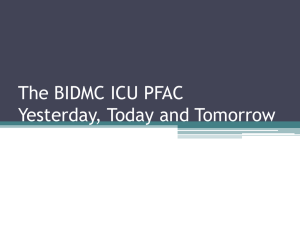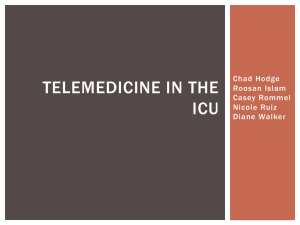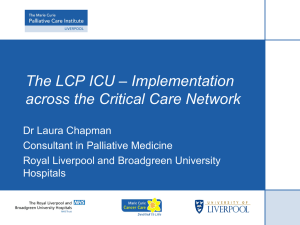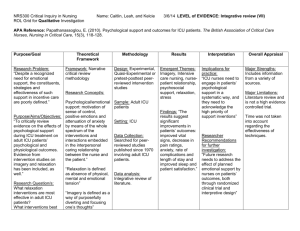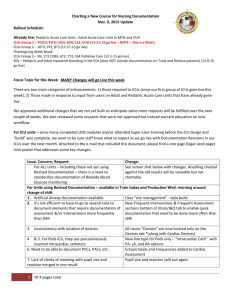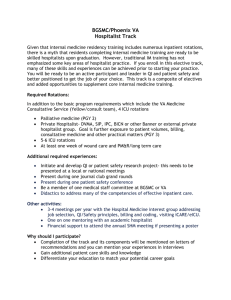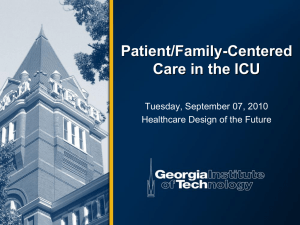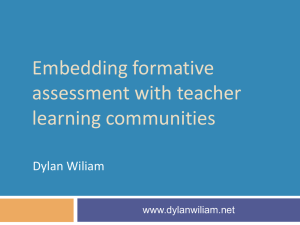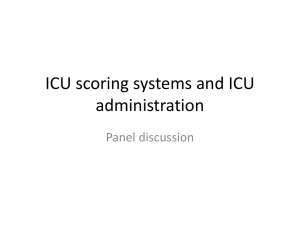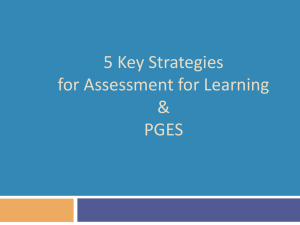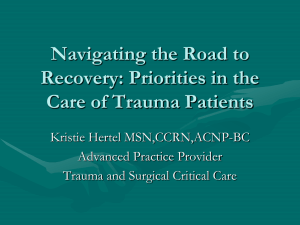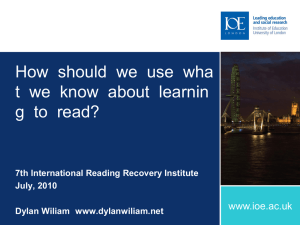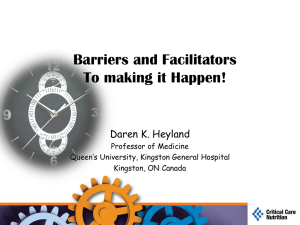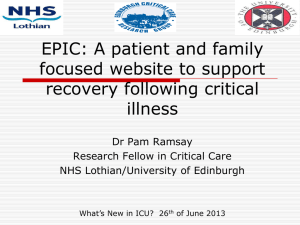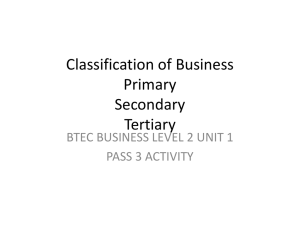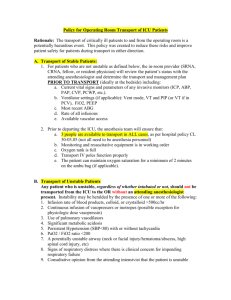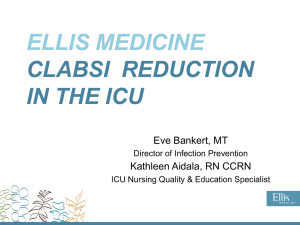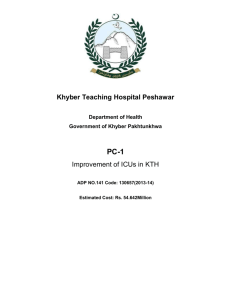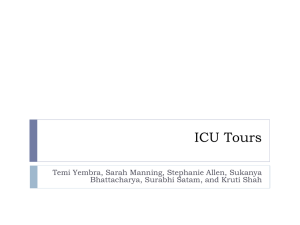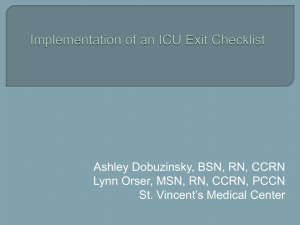Tele-ICU as an Adjunct to Care: The Family Voice
advertisement
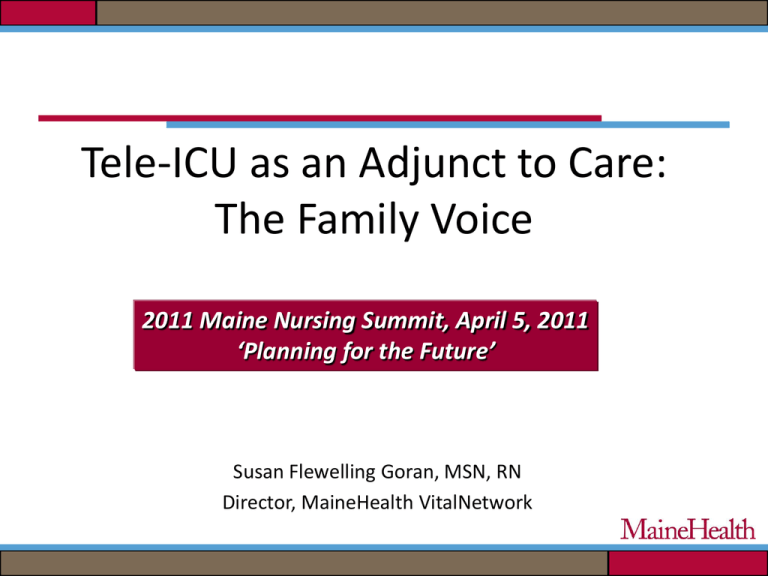
Tele-ICU as an Adjunct to Care: The Family Voice 2011 Maine Nursing Summit, April 5, 2011 ‘Planning for the Future’ Susan Flewelling Goran, MSN, RN Director, MaineHealth VitalNetwork Traditional ICU: Understanding the Needs of the Family • Feel hope • Feel that clinicians care about the patient • Be allowed to see the patient frequently; be called about changes in the patient condition • Know the prognosis • Know specific facts about the prognosis • Have questions answered honestly • Receive information about the patient daily • Have explanations given in understandable terms Molter, Heart & Lung 8:332-339,1979. Utilization of sophisticated telemedicine technology and a remote team of critical care experts to provide continuous monitoring, assessment, and interventional services to a large number of patients across geographically disparate ICUs. 3 What about the patients and families? • Are we providing the information that is most important to them? – Brochures – Posters in the waiting room – Website information • How do they feel about the tele-ICU? How can we answer the questions? • Family Perceptions of e-ICU: A Multi-site Collaborative Study the • PRINCIPAL INVESTIGATOR – Mary Jahrsdoerfer, MS, RN, PhD(c) – Doctoral Student- University of Massachusetts Amherst • CO-INVESTIGATOR – Susan F. Goran, MSN, RN – MaineHealth VitalNetwork; Operations Director • Western MA Academic Center • Tertiary Care Center Southern Maine • Tertiary & Community Care System Midwest Research Design Descriptive study using a convenience sample A survey tool distributed/collected during the patient’s hospital admission The package was distributed by volunteers (non-ICU staff) to family members within the immediate vicinity of the ICU The packet consisted of three distinct pages Demographic page (pre-filled) Letter of consent Survey questionnaire: 6 questions, 1 open-ended Do You have 10 Minutes? Your feedback is important to us! Please ask our volunteers if you wish to complete a survey about your visitation experience. You must be over 18 years of age, and able to read and speak English to participate. If no volunteer is available, please check back another time. Thank You! 7 Demographics • N = 198 (66% return rate 198/300) • Type of center: 51% tertiary, 11% academic, 38% community • Unit size: 58% 7-12 beds, 36% > 12 beds • Type of Unit: 46% Med-Surg Mixed, 52% specialty ICUs (Neuro, Cardiovascular, etc.) Have you received any information about the eICU? 65 /34% 132 /66% Yes No 31 Family Members How Would You Like to Receive Information? 98 respondents (50%) prefer to receive the information by talking with the ICU nurse. What type of information would you like to have about the eICU? Answer all that apply 11 How do you feel about the eICU? 88 (~45% response) Positive 2% N=2 Negative 19% N = 19 Neutral 79% N = 69 Response Trends Comfort Technology Safety/Quality 13 The Voice of the Family: The Positive (79%) Comfort A relief to know so many people are looking after my husband Feel good that while I am gone staff knows what is happening with my loved one Knowing that someone is watching is comforting Technology Glad my hospital has this type technology Important advancement to health care Safety/Quality Anything that helps ensure quality care is valuable as long as it does not get in the way of real time decision making Good to know the patient is safe Valuable to have another person monitoring my spouses’ vital information to insure that nothing inadvertently gets overlooked 14 The Voice of the Family: Other Feedback Negative: (2%) I am not a big fan of surveillance I would prefer my grandpa have person to person care rather than speaking to someone via camera Neutral: (19%) Didn’t know anything about it Need more information before I can answer I wasn't told, but I saw a camera in room, so more information about this would be appreciated 15 Implications for Future Practice Staff Education Importance of information directly from the nurse Family desire for information, especially when cameras are visible Connect the relationship of the eICU to the potential of cost reductions by moving patients safely and quickly through the ICU and hospital Patient / Family Education Finding the right mix: method and information Expanding the research Video visitation ? 16 Planning for the Future
